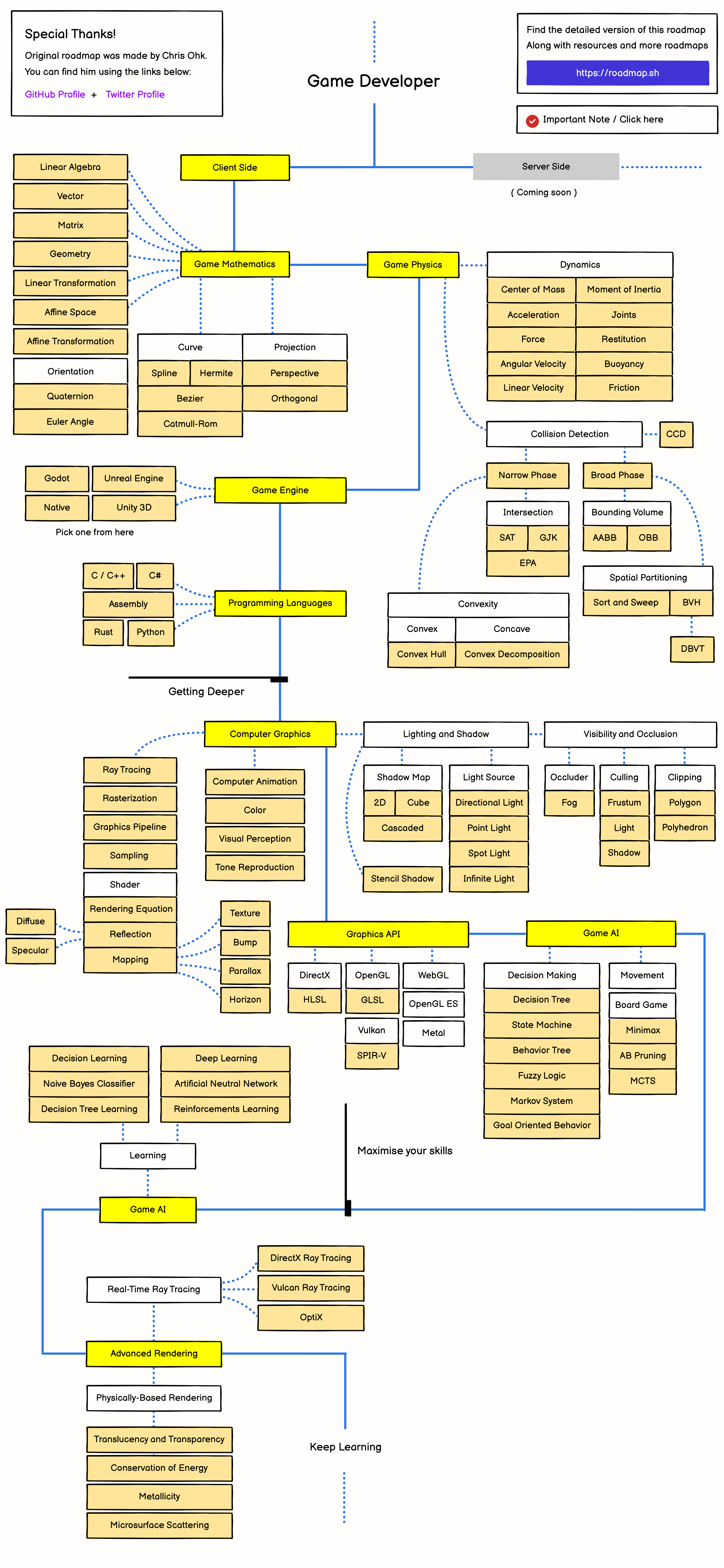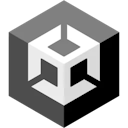- Published on
- 8
Unity Developer Roadmap - Client Side

In this article, I describe a developer's skill levels using terms like Familiarity, Knowledge, Understanding, Deep Understanding, Ability, Proficiency, and Mastery.
- Familiarity: You've aware of the concept or tool and have used it in actual projects, but you're not yet comfortable with how everything works.
- Knowledge: You understand the basic ideas and some more complex parts, but there's still more to learn, especially about the most advanced features.
- Understanding: You have a solid understanding, including some of the more complex aspects. You're able to solve common issues and can explain how things work to others.
- Deep Understanding/Ability: You have expert-level knowledge and can identify the pros and cons. You're adept at applying this knowledge to a variety of projects.
- Proficiency: You have a high level of skill and can use the concept or tool effectively and efficiently.
- Mastery: You have an outstanding level of expertise, with a deep and comprehensive understanding that enables you to innovate and teach the subject.
Junior Unity Developer Roadmap
1. Basic Programming Skills:
- Understanding of C# syntax.
- Knowledge of object-oriented programming.
- Ability to write clean, readable, and maintainable code.
- Familiarity with exception handling in C#.
- Familiarity with design patterns and architecture patterns.
- Familiarity with multithreading.
2. Unity Basics:
- Proficiency in using the Unity Editor.
- Ability to create and manage scenes and prefabs.
- Ability to use Unity's scripting API.
- Understanding of game objects, components, and Unity's component-based architecture.
- Understanding of Unity's coordinate system and transformations.
- Understanding of Unity's input system.
- Knowledge of Unity's event system.
- Knowledge with Unity Physics system.
- Familiarity with Unity's animation system.
3. Game Mathematics:
- Ability to use mathematical functions for game mechanics.
- Understanding of coordinates, vectors, distance calculations, and transformations.
- Understanding of trigonometry and its application in games.
- Understanding of interpolation and extrapolation.
- Knowledge of linear algebra and geometry.
- Knowledge of quaternions and their use in rotations.
4. Basic Computer Graphics (3D):
- Understanding of textures, materials, and lighting in Unity.
- Understanding of UV mapping.
- Understanding of real-time rendering vs baked rendering.
- Understanding of normal maps and bump mapping.
- Knowledge of particle systems.
- Knowledge of level of detail (LOD) techniques.
- Familiarity of shaders and rendering pipelines.
- Familiarity with camera controls and settings.
- Familiarity with post-processing effects.
5. Basic Game AI:
- Ability to create simple AI behaviors for non-player characters.
- Ability to create dynamic AI responses to player actions.
- Ability to balance AI difficulty.
- Understanding of pathfinding algorithms and state machines.
- Understanding of navigation meshes.
- Familiarity with decision-making algorithms.
6. Basic Networking:
- Understanding of client-server architecture.
- Understanding of peer-to-peer architecture.
- Familiarity with a networking framework
7. Tools and Plugins:
- Ability to use debugging and profiling tools in Unity.
- Knowledge of source control systems like Git.
- Knowledge of localization for different regions.
- Familiarity with Unity's asset pipeline.
- Familiarity with scripting tools and custom editor tools.
- Familiarity with game analytics tools.
- Familiarity with monetization plugins.
8. Portfolio Development:
- Ability to apply learned skills in small projects.
- Ability to receive and apply feedback to improve projects.
- Ability to balance scope and quality in a project.
- Ability to work in a team.
- Understanding of intellectual property rights and licensing.
- Understanding of project management and task tracking.
- Understanding of game design documents and prototyping.
Senior Unity Developer Roadmap
1. Advanced Programming Skills:
- Mastery of C# and object-oriented programming.
- Proficiency in design patterns and architecture patterns.
- Proficiency in error handling and exception management.
- Proficiency in advanced data structures and algorithms.
- Abiltiy to refactor and optimize code.
- Understanding of multithreading and asynchronous programming in Unity.
- Understanding of dependency injection.
- Knowledge of memory management in Unity.
- Familiarity with test-driven development and unit testing.
2. Advanced Unity Skills:
- Proficiency in state transitions and scene management.
- Proficiency in Unity's Animation System.
- Ability to create custom editor tools in Unity.
- Deep understanding of Unity's UI system.
- Deep understanding of Unity's Asset Bundles.
- Understanding of localization in Unity games.
- Knowledge of Unity's rendering pipeline.
- Knowledge of Unity's Scriptable Render Pipeline.
- Knowledge of Unity's networking stack for multiplayer games.
- Familiarity with shader programming.
3. Game Mathematics and Physics:
- Proficiency in linear algebra, geometry, and trigonometry.
- Ability to create custom physics systems.
- Deep understanding of game physics.
- Understanding of complex algorithms for game mechanics.
- Understanding of Bezier curves in game development.
- Understanding of quaternions and their use in rotations.
4. Advanced Computer Graphics: (3D)
- Proficiency in texture usage and material properties.
- Proficiency in level of detail (LOD) management.
- Proficiency in implementing post-processing effects.
- Ability to optimize draw calls and batching.
- Understanding of normal maps and bump mapping.
- Familiarity with real-time rendering and physically-based rendering.
5. Advanced Game AI:
- Proficiency in pathfinding algorithms and state machines.
- Proficiency in AI animation control.
- Ability to create complex AI behaviors.
- Ability to balance AI challenge and player enjoyment.
- Familiarity with decision-making algorithms and dynamic AI responses.
6. Server Side:
- Understanding of server logic and how it integrates with the game client.
- Knowledge with server-side programming with languages like Node.js or C#.
- Knowledge of database management and data storage solutions for game servers.
6. Networking and Multiplayer:
- Understanding of network programming for multiplayer games.
- Understanding of server architecture and network security.
- Understanding of peer-to-peer networking.
- Understanding of game state synchronization.
- Understanding of data replication and consistency across clients.
- Familiarity with real-time multiplayer game development.
- Familiarity with authoritative servers in multiplayer games.
7. Tools and Plugins:
- Proficiency in source control systems like Git.
- Proficiency in using debugging and profiling tools in Unity.
- Proficiency in localization for different regions.
- Ability to create unit testing and test-driven development.
- Familiarity with build automation and continuous integration.
- Familiarity with scripting tools and custom editor tools.
8. Building and Releasing:
- Deep understanding of the build process in Unity.
- Understanding of user data management and privacy regulations.
- Familiarity with releasing and maintaining a game on different platforms.
- Familiarity with app stores and submission processes.
9. Portfolio Development:
- Proficiency in working in a team.
- Proficiency in documenting and presenting projects.
- Ability to lead projects and mentor junior developers.
- Ability to balance scope and quality in a project.
- Ability to receive and apply feedback to improve projects.
- Understanding of project management and task tracking.
- Understanding of intellectual property rights and licensing.
Please remember that this plan is based on what I know and have seen, and the real steps you take might change depending on your own situation and what the job you want needs. Always learning new things and keeping up with the newest tech is important to do well in this area.
